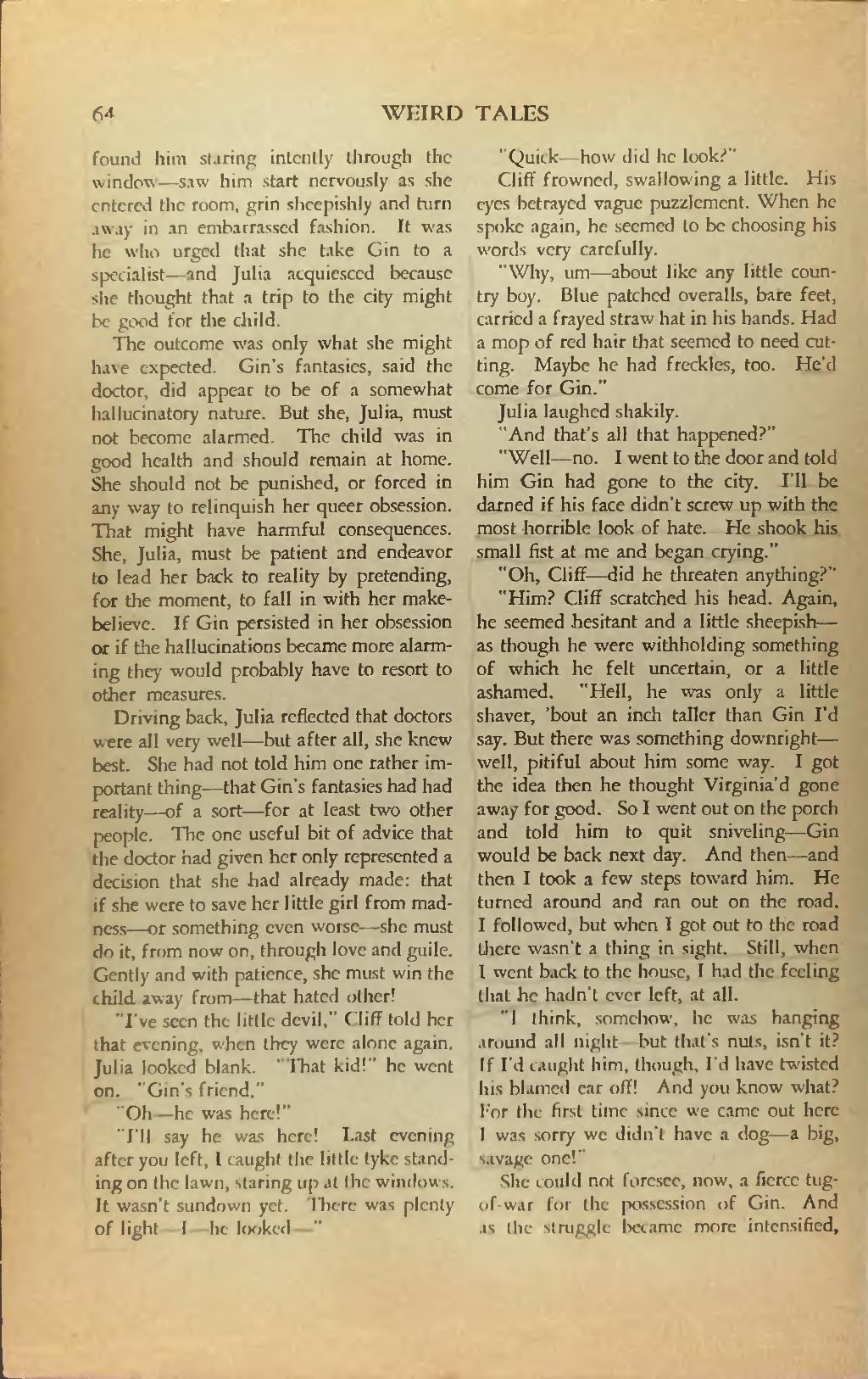found him staring intently through the window—saw him start nervously as she entered the room, grin sheepishly and turn away in an embarrassed fashion. It was he who urged that she take Gin to a specialist—and Julia acquiesced because she thought that a trip to the city might be good for the child.
The outcome was only what she might have expected. Gin's fantasies, said the doctor, did appear to be of a somewhat hallucinatory nature. But she, Julia, must not become alarmed. The child was in good health and should remain at home. She should not be punished, or forced in any way to relinquish her queer obsession. That might have harmful consequences. She, Julia, must be patient and endeavor to lead her back to reality by pretending, for the moment, to fall in with her make-believe. If Gin persisted in her obsession or if the hallucinations became more alarming they would probably have to resort to other measures.
Driving back, Julia reflected that doctors were all very well—but after all, she knew best. She had not told him one rather important thing—that Gin's fantasies had had reality—of a sort—for at least two other people. The one useful bit of advice that the doctor had given her only represented a decision that she had already made: that if she were to save her little girl from madness—or something even worse—she must do it, from now on, through love and guile. Gently and with patience, she must win the child away from—that hated other!
"I've seen the little devil," Cliff told her that evening, when they were alone again. Julia looked blank. "That kid!" he went on. "Gin's friend."
"Oh—he was here!"
"I'll say he was here! Last evening after you left, I caught the little tyke standing on the lawn, staring up at the windows. It wasn't sundown yet. There was plenty of light—I—he looked—"
"Quick—how did he look?
Cliff frowned, swallowing a little. His eyes betrayed vague puzzlement. When he spoke again, he seemed to be choosing his words very carefully.
"Why, um—about like any little country boy. Blue patched overalls, bare feet, carried a frayed straw hat in his hands. Had a mop of red hair that seemed to need cutting. Maybe he had freckles, too. He'd come for Gin."
Julia laughed shakily.
"And that's all that happened?"
"Well—no. I went to the door and told him Gin had gone to the city. I'll be darned if his face didn't screw up with the most horrible look of hate. He shook his small fist at me and began crying."
"Oh, Cliff—did he threaten anything?"
"Him? Cliff scratched his head. Again, he seemed hesitant and a little sheepish—as though he were withholding something of which he felt uncertain, or a little ashamed. "Hell, he was only a little shaver, 'bout an inch taller than Gin I'd say. But there was something downright—well, pitiful about him some way. I got the idea then he thought Virginia'd gone away for good. So I went out on the porch and told him to quit sniveling—Gin would be back next day. And then—and then I took a few steps toward him. He turned around and ran out on the road. I followed, but when I got out to the road there wasn't a thing in sight. Still, when I went back to the house, I had the feeling that he hadn't ever left, at all.
"I think, somehow, he was hanging around all night—but that's nuts, isn't it? If I'd caught him, though, I'd have twisted his blamed ear off! And you know what? For the first time since we came out here I was sorry we didn't have a dog—a big, savage one!"
She could not foresee, now, a fierce tug-of-war for the possession of Gin. And as the struggle became more intensified,
